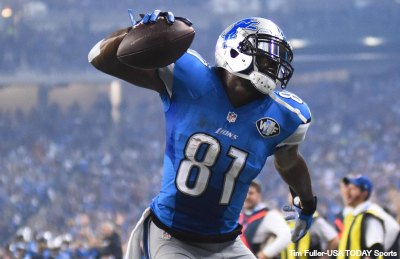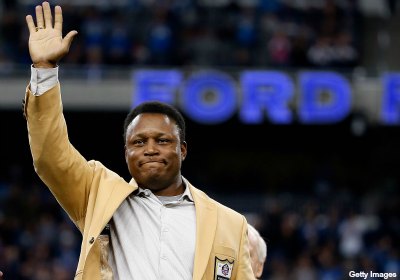If this really is the end of Calvin Johnson's NFL career, then it's much more than a final goodbye for one of a generation's greatest football players. His departure, as a 30-year-old, is the dinner bell ushering in a new era for professional football -- and a big problem for the NFL.
Johnson has decided to retire, per a report from ESPN. In fact, he allegedly told two Lions teammates, including quarterback Matthew Stafford, of his intentions during the season. He approached the Lions front office with his decision just a day after the season ended, but accepted the team's offer to take some time before making his decision.
Apparently, that time did nothing to dissuade the star wide receiver. A month after the end of the regular season, he is reportedly as content as ever with his decision. That makes Johnson the ninth NFL player in the past calendar year to retire at 30 or younger. He's also the most successful player of that group, by a large margin.
Nowadays, concussions take the spotlight when we talk about the NFL's violence. Johnson is a reminder that concussions are only the most urgent of a long list of health considerations football players face. His grievances, per unnamed sources speaking to ESPN, are more general: The game has simply worn down his body, to the point that the game is no longer worth the sacrifice.
Football players have always had to balance the game against its physical consequences. But instead of doing it in their late-30s, those same athletes are now weighing the pros and cons in their 20s, sometimes even before the primes of their careers. Johnson's career is at the end of his best playing days, but he easily could have played longer, and continued to dominate for some of that time.
Instead, he's tapping out.
Does playing for the Lions have anything to do with this? It's possible. Johnson had said during the season that he wanted to win. He had hinted that his offseason decisions would hinge on his health and his ability to compete for a Lombardi Trophy.
Detroit is likely facing a rebuilding effort now, after poor front-office management squandered draft picks while allowing top talent to leave town. Johnson wasn't going to help Detroit win meaningful January games before his body let him down.

But with a $24 million cap hit, Johnson was likely to be cut by Detroit or coaxed into a restructured contract. Either way, he had tens of millions of dollars to look forward to. And if he had wanted to be traded to a contender, he probably could have gotten that wish, too.
Instead, the Lions' modern-day claim to fame is soon to become a dubious distinction: It could be the only franchise in the NFL whose two greatest players, with Barry Sanders being the other, chose to retire with gas in the tank.
To this point in his career, Johnson's numbers stand alongside history's greatest wide receivers. Only Jerry Rice and Torry Holt hauled in more catches during their first nine years than Johnson. Only Randy Moss compiled as many receiving yards by this point in their careers. Johnson was dominant, and he did so while mostly playing for bad teams.
It's likely Johnson wouldn't have maintained that pace well into his 30s. Rice, and to a lesser extent Moss, both enjoyed longevity and health that has eluded Johnson. Even if he could have managed another season or two, the soreness and fatigue affecting his body would have cut into his productivity.
Hearing of Johnson's physical struggles are reminiscent of Antwaan Randle-El's story, in which a Super Bowl-winning wide receiver now struggles to walk down stairs at 36.

It's impossible to know without hearing from Johnson himself, but it would make perfect sense. The modern-day athlete is more concerned than ever with the long-term effects of their short-term physical sacrifices. Even the NBA's Derrick Rose has discussed his multiple knee injuries in the context of his quality of life decades into the future, saying he doesn't want to be disabled in his 40s.
Football is far more punishing than basketball, but those attitudes transcend the boundaries of individual sports. Perhaps it's an unintended blessing that athletes are paid such lucrative contracts: Guys like Johnson can remove financial considerations from the equation. As concerns about football's physical affects become harder to ignore, players are reaching a crossroads where the fulfillment of playing the game today is balanced against the fulfillment of a long, able-bodied life.
Some guys, like San Francisco's Chris Borland, reach that crossroad after their rookie season and decide enough is enough. Others, like Tampa Bay safety Chris Conte, arrive at the same junction in their mid-twenties and commit their life -- and possibly their death -- to football.
Both sides are represented. But not since Sanders has such a dominant football player walked away with years left in the tank. The difference with Johnson is his argument for quitting, and how his retirement places him in a new, growing group of peers. Years after retiring, Sanders said that Detroit's losing culture killed his desire to play the game.
It's hard to imagine Johnson, still just 30, walking away from a Super Bowl contender. And yet it's no surprise, either, that a multi-millionaire would wake up one day, his body stiff and sore from the game's endless abuses, and finally say, "Enough."














